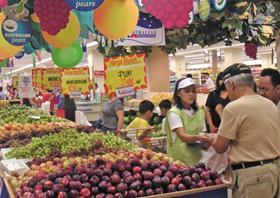
Indonesian horticultural imports could resume in earnest by June, according to The Jakarta Post.
The country’s controversial import regulations, including a blanket ban on 13 kinds of horticultural products, are expected to be scrapped in favour of new legislation drafted by the Indonesian Agriculture Ministry.
“We are currently waiting for the Law and Human Rights Ministry to pass the draft,” Indonesian Agriculture Ministry member Yasid Taufik told the Post.
“The regulation is expected to be issued in June at the latest, before importers start to order horticultural products to be brought into the country in the second half of this year.”
In late 2012, the Indonesian government drafted Ministerial Regulation No. 60/2012, which banned the importation of 13 fruit and produce items and placed limitations on seven others, effective from January to June 2013.
The government claimed the regulations were aimed at protecting Indonesian growers, who harvest the banned products during the first half of the year.
Importers were also required to obtain licenses by way of recommendation from the Indonesian Agricultural Ministry, while imports could only enter via four designated gateways.
The restrictions were met with heavy criticism from importers, including the US government, which requested consultations with the World Trade Organisation.
Under the revised regulations, import bans will be lifted and replaced by a quota system, with allocated quantities to vary for each product.
The quotas will be moderated around Indonesian production windows, with imports to be limited during times of domestic production.
It is hoped the new regulations will help avoid drastic price fluctuations, caused by oversupply and undersupply in the market.
“We have formed a team with the Central Statistics Agency (BPS) to study demand and the cultivation period for each commodity, so we will know when and how much we should import,” Taufik said.
A more streamlined approach to issuing importers licenses will also be taken, which will enable requests to be processed within a week. An online-based system will be established by the Ministry of Trade, which can be accessed by the Ministry of Agriculture to issue a recommendation.



